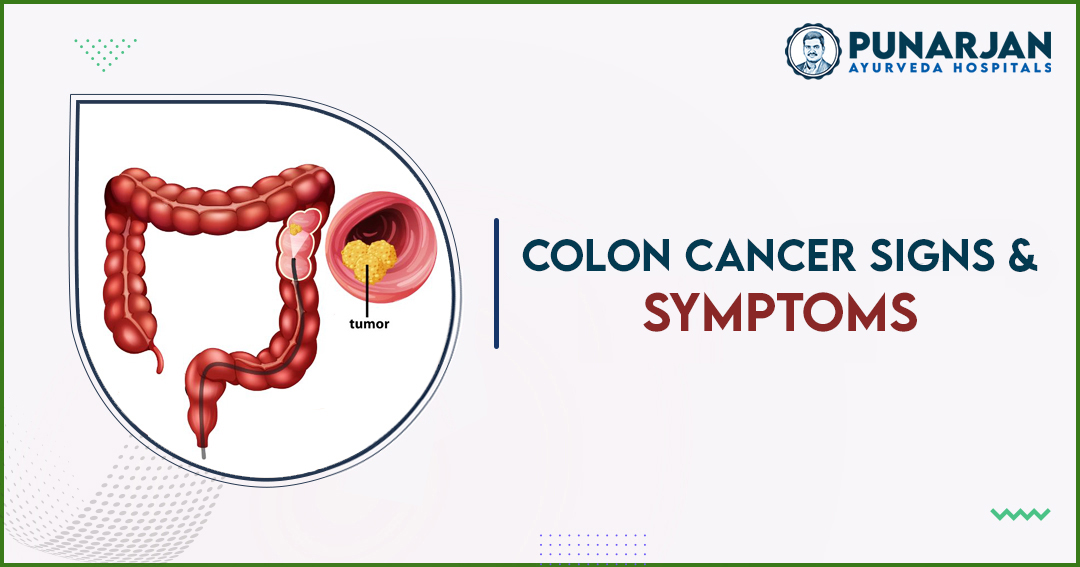
Signs & Symptoms of Colon Cancer
Colon cancer, also known as colorectal cancer, is a type of cancer that develops in the large intestine (colon) or rectum. It typically begins as a small, noncancerous growth called a polyp on the lining of the colon or rectum, which over time may become cancerous. The cancer can then grow and spread to nearby tissues and organs, and can also spread to other parts of the body through the bloodstream or lymphatic system.
- Changes in bowel habits: Diarrhea or constipation that lasts for more than a few days, or a feeling of not having completely emptied the bowel.
- Blood in the stool: Bright red blood in the stool or black, tarry stools.
- Abdominal pain or discomfort: Cramping, bloating, or pain in the abdomen.
- Unexplained weight loss: Losing weight without trying could be a sign of colon cancer.
- Fatigue: The feeling of being tired or weak without any obvious or apparent reason.
Iron deficiency anaemia: Low red blood cell count due to blood loss from the colon.
It is important to note that some of these symptoms may also be caused by other conditions, and not necessarily indicative of colon cancer. It is advisable to seek consultation from a healthcare professional for an accurate diagnosis if you experience any of these symptoms.
Causes of Colon Cancer
The exact cause of colon cancer is not fully understood, but there are many factors that contribute to the increase in the risk of developing Colon Cancer.
Age: The risk of developing colon cancer increases as you get older, especially after the age of 50.
Family history: If you have a first-degree relative (parent, sibling, or child) who has had colon cancer, you are at a higher risk of developing the disease.
Inherited gene mutations: Some genetic syndromes, such as Lynch syndrome and familial adenomatous polyposis (FAP), can increase the risk of colon cancer.
Personal history of colorectal polyps or cancer: If you have had colorectal polyps or cancer before, you are more likely to develop colon cancer again.
Inflammatory bowel disease (IBD): Ulcerative colitis or Crohn’s disease, which cause chronic inflammation in the colon, can increase the risk of colon cancer.
Diet and lifestyle factors: A diet high in red and processed meat, low in fiber, and high in fat may increase the risk of colon cancer. The risk may also be heightened by factors such as physical inactivity, obesity, and smoking.
It is important to note that having one or more of these risk factors does not necessarily mean you will develop colon cancer, but it is recommended that individuals with a higher risk of colon cancer undergo regular screening tests to detect the disease early.
Prevention of Colon Cancer
To minimize the likelihood of developing colon cancer, there are several measures that you can take:
Screening:
Regular screening tests, such as a colonoscopy, can detect colon cancer in its early stages when it is more treatable or prevent it from developing altogether.
Healthy diet:
A diet rich in fruits, vegetables, whole grains, and lean protein can help reduce the risk of colon cancer. Avoiding red and processed meat, sugary and fatty foods, and excessive alcohol consumption may also help.
Regular exercise:
Regular physical activity, such as brisk walking, jogging, or cycling, can help reduce the risk of colon cancer.
Quit smoking:
Smoking has been linked to an increased risk of colon cancer, so quitting smoking may help reduce the risk.
Limit alcohol consumption:
Excessive alcohol consumption has been linked to an increased risk of colon cancer, so limiting alcohol intake may help reduce the risk.
Maintain a healthy weight:
Being overweight or obese can increase the risk of colon cancer, so maintaining a healthy weight through diet and exercise may help reduce the risk.
It is important to note that while these steps can help reduce the risk of colon cancer, they do not guarantee that you will not develop the disease. It is also important to discuss your individual risk factors and screening recommendations with your healthcare provider.
Disclaimer:
This information on this article is not intended to be a substitute for professional medical advice, diagnosis or treatment. All content in this site contained through this Web site is for general information purposes only.
Know more about Every Men Need To Know About Prostate Cancer


